|
|
|
 |
VICTORIAN AND EDWARDIAN 'AD' (5) Presented by Ex PC 799 'A'/164477 Leonard Bentley |
 |
|
We are now nearing the end of our escorted tour of AD's ground of more than a century ago. Both Len and myself hope you have enjoyed the experience as much as we have enjoyed presenting it to you. JH. SOME MISSING BUILDINGS |
|
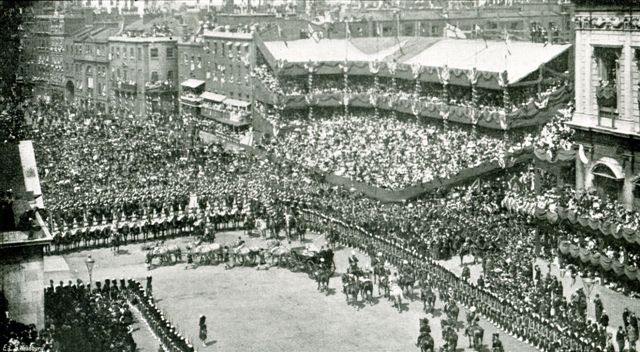 |
Later (much later) the site of 59 Traffic Point. Whitehall j/w Horseguards Avenue
|
| Queen Victoria's Diamond Jubilee 1897 Above: Photograph shows Queen Victoria’s Diamond Jubilee procession entering Horseguards from Whitehall on the afternoon of Tuesday 22nd June 1897. The large temporary grandstand on the corner of what became Horseguards Avenue seated over 4,000 people. The site had been vacant since 1886 when the previous building, Carrington House had been demolished; it dated from 1764 and even in the 1880s there was a public outcry at plans to demolish the building. There had been a proposal to move Carrington House a short distance northwards by using rollers, but this plan proved too expensive. The site was later used for The War Office which was built between 1899 and 1906. In 1831 the United Services Institution was founded and moved into Vanbrugh House. In 1860 the Institute received The Royal charter and became The Royal United Services Institution and in 1890 due to lack of space for its museum the Queen gave permission for the Institution to move into the Banqueting House in Whitehall. Space was still required for the Library and Lecture rooms and in 1895 the RUSI building designed by Sir Aston Webb was opened adjoining The Banqueting House; it was built on the site of stables belonging to Dover House. In 1960 the museum was dispersed to other institutions after The Banqueting House was taken over by the Government. Situated behind the Banqueting House were Whitehall gardens, they were demolished in 1938 to make way for new Government buildings which became the MOD. Sir Robert Peel lived at No.3 and on Saturday 30th June 1850 he took his usual ride in St. James’s Park; whilst speaking to a young lady in Constitution Hill his horse reared up and threw him to the ground causing serious head injuries. He was at first taken to St. George’s Hospital at Hyde Park Corner and then taken home where he died from his injuries the next day. |
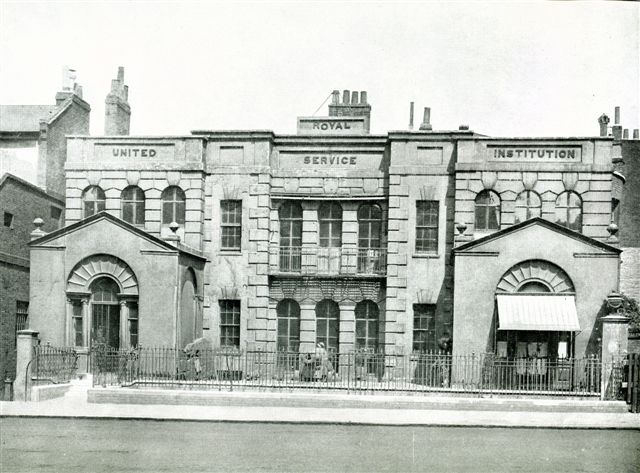 |
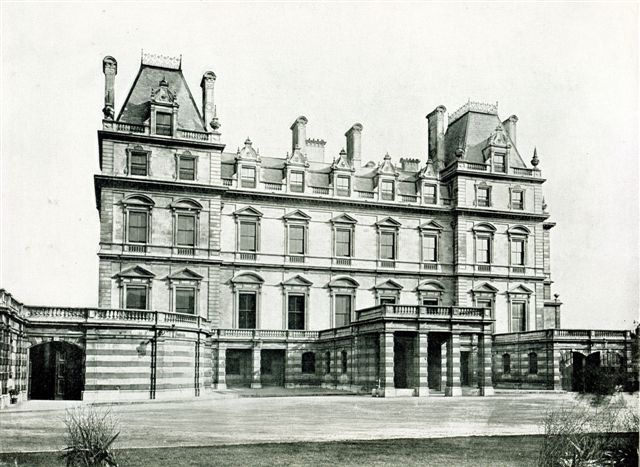 |
Left: Montagu House, Whitehall Photograph shows Montagu House the home of The Duke of Buccleuch which was situated next to Richmond Terrace and fronted onto Whitehall. It was built in 1733 and completely rebuilt between 1853-1859. The building ended its days as the headquarters of The Ministry of Labour. |
| Right: The Banqueting House, Whitehall Right: This photograph of the Banqueting House dates from 1882 and clearly shows the edges of both Carrington House on the left and the stable block belonging to Dover House on the right, the narrow roadway between The Banqueting House and Carrington House was called Whitehall Yard. The Banqueting House was the only building to survive the fire which destroyed Whitehall Palace in 1695, designed by Inigo Jones in 1619 it was the first London building to be faced in Portland stone. It has been used for Balls and masques, the execution site of Charles I, the setting of restoration celebrations and a Royal Chapel although it was never consecrated. It is a pivotal building in the history of the last 400 years and is well worth a visit. |
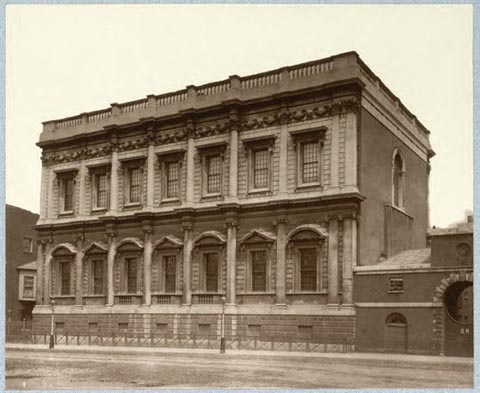 |
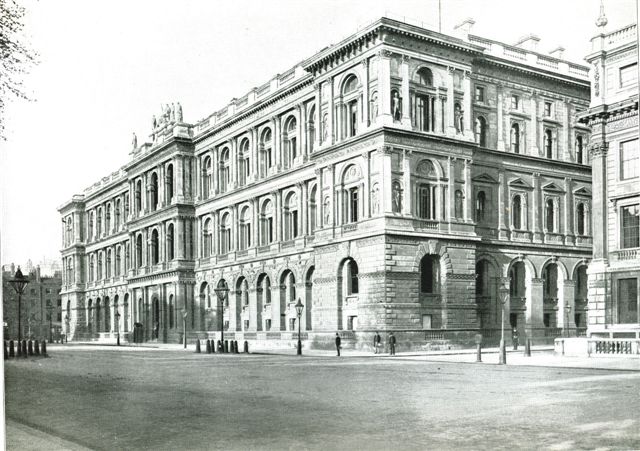 |
Left: Downing Street j/w Whitehall Photograph shows Downing Street junction with Whitehall, on the left you can just see the buildings at the end of King Street which were demolished in 1898. The large Government building on the south side of Downing Street is the Foreign Office, part of which later became the Home Office. It was designed by Sir Gilbert Scott and built in 1868. I was posted to the door of No.10 for two and a half years in the mid seventies and during the hot summer of 1976 due to the shadow cast by the foreign office the temperature in the street was quite pleasant, it contrasted markedly with Whitehall during the walk to refs. I think I hold two unique records whilst on the door, I received a 163 for assault and my visiting 2 year old nephew urinated on the step, although not at the same time. |
| Right: Whitehall, A General View This view of Whitehall looking north shows two Gentlemen’s toilets in the middle of the road surrounded by iron railings. I have other photographs of the scene taken a year or so earlier than 1895 and the toilets are not there. Does anyone know how long they survived; are they still there buried underneath the carriageway like Victorian time capsules? My interest in toilets is purely academic save for the usual functions. We have now completed our personally escorted tour courtesy of Ex PC 799'A'/164477 Leonard Bentley. Alpha Delta Plus thanks Len for all his hard work in presenting this excellent tour of Cannon Row's ground over 100 years ago. We both hope that you have enjoyed the experience.
Maybe a quick pint in the 'Red Lion' is called for ?
JH. |
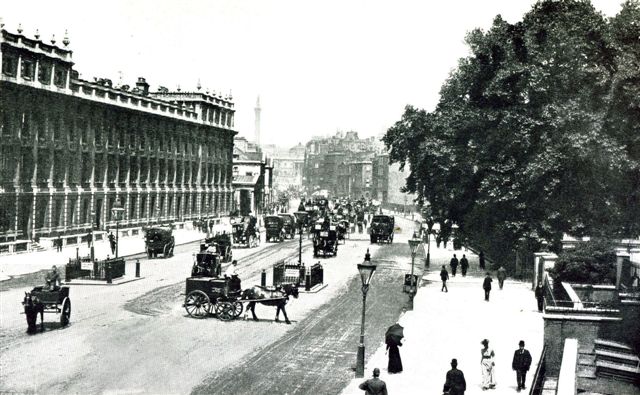 |
| Click on the helmet image for 'SIGNPOST' (Express Navigation) OR To retrace your steps click on 'Victorian and Edwardian AD (4) (3) (2) or (1)' from menu at top of page
|
|
|
|
The escorted tour has now been completed but Leonard has some more great pictures and facts about Cannon Row's ground over a century ago. To view these Victorian and Edwardian 'extras' click on the Met Crest below. |
|
|
|
|